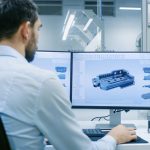
The Switzerland-based aerospace startup, Destinus SA, wants to build a hydrogen-powered hyperplane to address the need for rapid and clean transportation. Destinus moved a step closer to realizing its dream after it raised 26.8 million Swiss francs ($29 million) in a seed funding round.
While the automotive industry is set to move to battery-powered electrification to address carbon emissions, the airline industry’s switch will not be that easy. Battery-powered flights, although in trials and development, have huge hurdles to cross with regards to their endurance and carrying capacities. While battery-powered Air Taxis might solve the problems of traveling within a city, the airline industry has its eyes set on alternative fuels such as hydrogen.
The greatest advantage of using hydrogen as a source of energy is that it gives off zero carbon emissions. When it is burnt as fuel, hydrogen produces water as a by-product, which can be split again using environmentally friendly methods to make the fuel again, a big gain for the transport sector. Destinus wants to take this concept a step further by powering hypersonic flights using this fuel.
A plane that flies at rocket speeds!
According to the press release, Destinus envisions a hyperplane that is a hybrid between a plane and a rocket. The hyperplane does not need special infrastructure since it can use existing airports to take off and land. However, when it reaches a certain altitude, it will switch to its cryogenic rocket engine that will propel the plane at hypersonic speeds and reduce traveling time between continents to a matter of a couple of hours.
The company is founded by Mikhail Kokorich, a serial entrepreneur with engineering, technical and organizational skills. The company currently has a team of over 50 engineers and managers who have previously worked at Arianespace, Boeing, Airbus, Dassault, Rolls-Royce, and other major aerospace companies. It plans to increase its team size to 100 this year to step up its research and development efforts and initiate flight testing.
In the short duration of its existence, the company has already designed unique subsystems such as an active cooling system for its hyperplane and patented it as well, the press release claims. The concept has been backed by various venture funds from across the globe and the company wants to use this funding to develop its hydrogen airbreathing rocket engines and conduct supersonic test flights within the next 18 months.
The chairman of the company’s Advisory Board is the former minister of Economics and Technology, and the vice-chancellor of Germany, Philipp Rösler. A passionate pilot himself, Rosler said, “It is breathtaking to see a future in which travel anywhere in the world in 1-2 hours will be available. The hyperplane under development will use liquid hydrogen to fuel its engines. That gives the great opportunity to fly fast and at the same time be carbon neutral. I am excited that companies like Destinus will be able to provide European leadership in the aerospace sector.”

